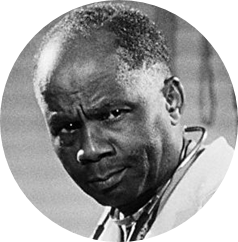
The first black South African to qualify as a medical doctor in Johannesburg. Leader; political activist; and former general president of the ANC. Revitalized ANC’s dwindling membership at the time. Helped to prevent South Africa from annexing Namibia.
President of the African National Congress (ANC) from 1940 -1949 inheriting an organization much in disarray at the time. Dr Xuma created the ANC’s Youth League and Women’s League, respectively. Dr Xuma initiated “The Graduates” program to recruit intellectuals into the ANC – this program recruited Nelson Mandela, OR Tamba and Walter Sisulu and others notables to the ANC. Moreover, Dr Xuma is given credit for increasing the ANC’s membership base at a time of dwindling membership interest. Under Xuma, the ANC adopted a new constitution which still forms the basis for how the modern day ANC organization operates.
In the 1940s / 50s, Dr Xuma worked closely with Paul Robeson, W.E.B. Dubois and Max Yergan (all members of Alpha Phi Alpha Fraternity) and their organization called the Council for African Affairs (CAA) to protest against South Africa’s racial inqualities lobbying the United Nations and other world bodies. The CAA helped the ANC present its case in against the apartheid before the United Nations for first time. Further, the CAA and Dr Xuma prevented ed South African from annexing Namibia (formerly South West Africa) through advocacy at the United Nations.
Dr Xuma joined Alpha Phi Alpha – Alpha Xi Chapter in 1923 at Marquette University.

Key leader of the U.S. Civil Rights Movement. Supported South Africa’s anti-apartheid movement including joint public appeals against apartheid with Chief Albert Luthuli. Made many high profiles speeches linking apartheid and U.S. civil rights matters.
Martin Luther King believed South Africa was home to ‘‘the world’s worst racism’’ and drew parallels (publicly) between struggles against apartheid in South Africa and struggles against ‘‘local and state governments committed to ‘white supremacy’’’ in the southern United States).
King’s first public call for economic sanctions against the government of South Africa came in a statement issued jointly with Chief Albert Luthuli on December 10, 1962: “Appeal for Action against Apartheid.”
En route to Oslo to receive the Nobel Peach Prize in 1964, King made a major speech speaking out in London against apartheid. Specifically King said in London that: “In our struggle for freedom and justice in the United States, which has also been so long and arduous, we feel a powerful sense of identification with those in the far more deadly struggle for freedom in South Africa. We know how Africans there, and their friends of other races, strove for half a century to win their freedom by non-violent methods.“
Dr King joined Alpha Phi Alpha – Sigma Chapter in 1952 at the City Chapter of Boston
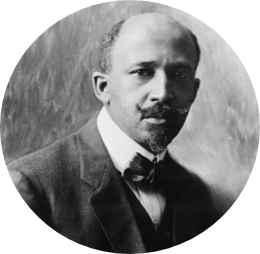
Considered greatest black intellectual of all time by many. Activist; scholar; writer; editor of journals; co-founder of the Niagara Movement; the NAACP; and the Pan African Congresses; international spokesperson for the rights of oppressed Africans and African Americans, respectively.
Dr W.E.B. Du Bois is considered the father of the pan-Africanist movement. He co-founded the first Pan African Congress in 1900 in London calling for a unified perspective on the fate of Africa embracing both Africans in Africa and in its Diaspora.
Du Bois joined the Council on African Affairs (CAA) (alongside two other fellow Alpha fraternity men – Paul Robeson and Max Yergan), where he chaired the Africa Aid Committee supporting the early struggle of the ANC against apartheid.
One of Du Bois’ most scathing critiques of South Africa was delivered through an open letter to the New York Times in 1946 partly co-written by ANC President, Dr. Alfred B. Xuma. Du Bois wrote:”…disenfranchisement in South Africa makes democracy unworkable in the nation and a third party impossible. Their [Africa] rights to travel, domicile, use of public facilities, and the right to work are widely infringed. Five thousand of them [Africans] in fifty years have been lynched by mobs without trial and no lyncher has been punished; as the Attorney General of the nation admits, the law gives no adequate ground on which to prosecute.”
Dr Du Bois joined Alpha Phi Alpha – Epsilon Chapter in 1909 at University of Michigan.
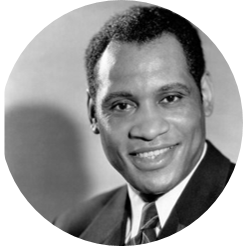
Founder of Council on African Affairs; famous musician; actor and influencer during the Harlem Renaissance; professional Football Player in the NFL; valedictorian at Rutgers University (1st African American).
Paul Robeson was renaissance man as a lawyers, stellar professional athlete and performing artist.
However, after studying in London and being exposed to African history, Robeson came back to the U.S. with a profound views on Africa. Thereafter, Robeson began working with forward-thinking radicals such as W.E.B. Du Bois, Max Yergan, to name a few. to In 1937, Robeson founded the Council for African Affairs which promoted African liberation in an era when few Americans actively engaged in such matters.
Due to Robeson’s relationship with Dr Xuma (both being members of Alpha Phi Alpha), Robeson directed a significant amount of resources and time to apartheid situation in South Africa. Perhaps its greatest achievement came in 1946, when the CAA submitted a memorandum to the United Nations Commission on Human Rights in support of the African National Congress (ANC). With Robeson’s support, the ANC successfully fought to prevent the annexation of South-West Africa (now Namibia) by racist, white minority-ruled South Africa.
Paul Robeson joined Alpha Phi Alpha – Nu Chapter in 1919 at Lincoln University.

First African American to become the U.S.’ UN Ambassador; Georgia Congressman, Mayor of Atlanta and Civil RIghts Leader and anti-apartheid activists in 1980s/90s; President of the National Council of Churches.
After the election of fellow Georgian Jimmy Carter as President in 1976, Young was appointed by Carter to serve as the US Ambassador (first-American appointed such a position) to the United Nations. There, Young was a consistent critic of white minority rule in South Africa and Rhodesia (Zimbabwe). His support for liberation movements in both nations led him to make statements critical of Great Britain and other American allies for their role in supporting the regimes.
In the 1980s, Young lodged very public critiques against South Africa putting pressure on American corporates to divest from South Africa.
In 1994, President Bill Clinton appointed Ambassador Young as Chairman of the $100 million Southern Africa Enterprise Development Fund which invested in African growth companies throughout Southern Africa.
In March 2016, Young travelled to South Africa where he was given the Keys to City of Durban and honored by both the U.S. and South African governments, respectively.
Andrew Young joined Alpha Phi Alpha – Beta Chapter in the early 1950s at Howard University
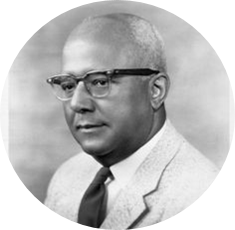
Ground-breaking author / researcher of African studies who contested conventional views of Africa from 1920s – 1960s. Co-founded Africa – America Institute which funds African students to the U.S., Africa and the world.
After receiving his bachelor’s degree from Harvard in anthropology, Dr Hansberry dedicated his life to proving the greatness and antiquity of African civilization through public research, books, lectures and teaching. Dr Hansberry is considered one of the greatest thinkers on African studies issues.
In his quest to further develop Africa’s access to tertiary education, he co-founded the Africa-America Institute (AAI) which is the premier U.S.-based international organization that works to increase the capacity of African individuals and institutions through higher education initiatives, leadership development, professional workforce training, convening activities, program implementation and management. Over the years AAI has provided over 22,000 Africans from 52 countries with professional training or advanced degrees in the US, Africa and other parts of the world.
In South Africa, AAI has supported over 1,000 South Africans to have access to advanced professional training and education since its founding including having set-up a regional office based in Johannesburg in 1992.
Dr Hansberry joined Alpha Phi Alpha – Mu Lambda Chapter in 1923 in Washington, D.C.
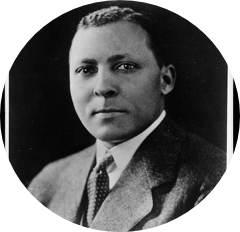
Yergan came to South Africa in 1920 as a missionary for the YMCA. Yergan’s work focused on students is given credit for heavily influencing the likes of Govan Mbeki, D. D. T. Jabavu and Z. K. Matthews.
Arriving in 1920, Max Yergan spent circa 17 years in South Africa as international secretary of the Young Men’s Christian Association (YMCA). Once in South Africa, he initially focused on work in native institutions and in studying the whole problem of the needs of the South African young men. He gave his time primarily to African students, but also encouraged night schools, recreation, promoted sanitation and religious education among members of the association and to villages throughout South Africa.. Over 2,000 participated in Bible study groups and between 400 and 500 were in various types of social service programs organized by Yergan.
Yergan is given credit for interacting with and heavily influencing two generations of New African intellectuals, that of D. D. T. Jabavu and Z. K. Matthews, and that of Govan Mbeki.
Yergan’s experiences in South Africa radicalized where resigned from the YMCA in 1936 and joined Paul Robeson and W.E.B DuBois at the Council of African of Affairs (CAA). Later in life, Yergan became more conservative and resigned from the CAA.
Max Yergan joined Alpha Phi Alpha – Beta Rho Chapter in the 1920s at Shaw University.
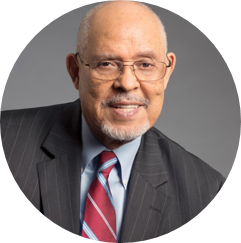
First US Ambassador to present credentials to President Mandela. Founded the US - Southern Africa Center for Leadership and Public Values at Duke University and University of Cape Town
Ambassador Joseph is currently a Professor of the Practice of Public Policy Studies at Duke University and founder of the United States – Southern Africa Center for Leadership and Public Values at Duke and the University of Cape Town.
He has served four U.S. Presidents. In 1995, he was nominated by President Bill Clinton and confirmed by the United States Senate as the U.S. Ambassador to South Africa. He was the only U. S. Ambassador to present his credentials to President Nelson Mandela.
In 1999, President Thabo Mbeki awarded him the Order of Good Hope, the highest honor the Republic of South Africa bestows on a citizen of another country. As a legacy and contribution to South Africa and the U.S.
Joseph helped found the Emerging Leaders Program, a pioneering effort in partnership with both the University of Cape Town and Duke University aimed at identifying and mentoring the next generation of significant leaders working to make an impact on the world.
James Joseph joined Alpha Phi Alpha – Beta Sigma Chapter in at Southern University in the late 1950s.
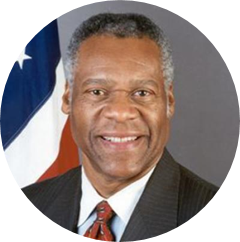
Attorney and Businessman named Ambassador to South Africa by Bill Clinton. Former CEO of the US Peace Corps and U.S. National Public Radio
Ambassador Lewis served as Ambassador to South Africa from 1999 – 2001 having been appointed by President Bill Clinton.
A trained lawyer by profession, Lewis has had a broad career which included public service as country director for the U.S. Peace Corps in Nigeria and Uganda to working as an attorney with the U.S. Department of Justice as well as serving as CEO of Chesapeake & Potomac Telephone Company and National Public Radio to serving on boards of prestigious corporations such as Apple, Black Entertainment Television, Colgate-Palmolive, Halliburton and Eastman Kodak.
Delano Lewis played a major role in supporting U.S. companies re-entering South Africa post-apartheid in his role as Ambassador as well as forging a strong relationship with then President Thabo Mbeki.
Delano Lewis joined Alpha Phi Alpha –Upsilon Chapter in the late 1950s at University of Kansas.